With the risk of severe illness from COVID-19 increasing with age, older adults have been encouraged to isolate during the pandemic. Unfortunately, these recommendations may lead to other concerns — research shows social isolation and loneliness are associated with increased risks of chronic conditions, hospitalization, and premature death.
UConn School of Social work students in the master of social work (MSW) and bachelor of social work (BSW) programs are connecting with older adults in Hartford and the surrounding area to help combat that isolation as part of a new research project known as SLIP: the Social isolation/Loneliness Intergenerational Project.
The 10 students assigned to the project as their fieldwork placement are each matched with four or five older adults, most of whom typically visit Hartford senior centers run by Catholic Charities, speaking by phone or video chat twice a week. The students will be trained on reminiscence therapy and life review techniques and will use them to build connections with their senior matches. A pre-test and a post-test will evaluate participants’ loneliness at the beginning and end of the eight-week period.
The visits will start by phone since most seniors are comfortable with that mode of communication, but may transition to video calls if the older adults are interested, possibly using OneClick.chat, access to which the company provided to the School of Social Work free for the year. The platform is designed to be easy to use for older adults, and the National Institutes of Health has funded studies on its use in combating social isolation.
“What I love about this project is it really was sparked by the needs of the community,” says assistant professor Rupal Parekh, who is co-leading the project with associate professor and MSW program director Brenda Kurz.
Early in the pandemic, Parekh asked Joel Cruz, a partner on another project and director of the Institute for the Hispanic Family and Family Strengthening Programs at Catholic Charities, how the older adults who regularly attend Catholic Charities senior centers were faring after the centers closed to keep them safe.
Despite programming being provided by the senior centers via video streaming services, according to Cruz, the seniors — many of whom would previously come to their senior center daily — really missed human connection.
“We hear in our visits, wellness checks, and phone calls, ‘I just really miss human touch, spending time with others I’ve become fond of,’” Cruz says. “A lot have lost weight, others will express that they feel anxious or depressed or go into crying spells while on the phone with their case manager.”
Often, 15-minute phone wellness checks would turn into 90-minute conversations. Parekh recalls Cruz telling her there was “no way” four or five staff members could meet the needs of the seniors who were calling several times per week.
Around that time, Kurz was working with MSW students whose in-person placements were canceled due to the pandemic, and wanted to start a service project to assist older adults in need. She reached out to Parekh, who specializes in working with older adults, and they brought the groups together.
“I was inspired by how quickly the faculty and staff developed programs in response to COVID-19 and related social work needs,” says Melanie Klinck ‘21 MSW, a student who participated this summer in the service project that became SLIP. “That’s something I’ll always remember. As social workers, we need to be flexible and adaptable and proactive; we need to serve the community’s immediate needs.”
Klinck says the man she was matched with seemed to really enjoy their conversations, and opened up to her about his life experiences more and more as the weeks progressed. But the benefits went both ways, she says.
“One thing I thought about during the program was that we tend to surround ourselves with people who are like us. This was a great opportunity to step out of our comfort zones to talk to someone different from ourselves,” Klinck says. “The intergenerational aspect really made it interesting. In the past, I’ve worked mostly with adolescents and young adults. This is one of the first times I’ve worked with the older adult population, and I would now consider working with older adults in my future career.”
Giving students experience working with older populations is a benefit of the program, Parekh says. “It’s a way to introduce students to how wonderful it can be to work with older adults. It’s critical that we do that in the School of Social Work.” According to 2017 U.S. Census data, Connecticut has the sixth-highest median age in the country.
The team is hopeful that SLIP will show the power of connection, and the therapeutic techniques used, to combat the effects of isolation.
The drastic measures taken in recent months to curtail the spread of the coronavirus have meant an abrupt end to activities that both older adults and college students are accustomed to and enjoy, says Parekh.
“Conversations using reminiscence therapy and life review techniques may help develop more positive feelings while reducing stress,” she says. “The intergenerational aspect of it helps build connections and may help reduce a sense of isolation for both groups.”
“Our case managers are connecting with our seniors, but there’s nothing to quantify the impact. Right now, it’s just stories,” Cruz says. “I think the study is going to solidify what the case managers have been noticing all along — that the more adults in isolation connect with people, even if it’s through the phone, the better.”



